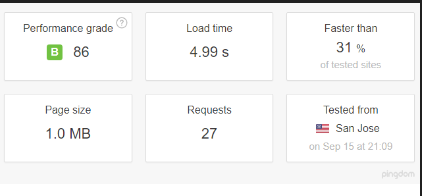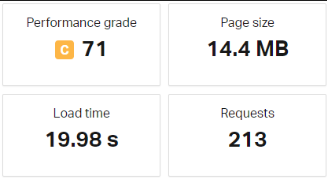When choosing between web hosting platforms, GoDaddy and Hostinger are two major players that come to mind. Both companies offer a variety of services for website creation and management, but which one is right for you? In this comprehensive comparison, we’ll dive into the key aspects of GoDaddy vs Hostinger and help you make an informed decision.
Overview of GoDaddy and Hostinger
Before we compare these hosting giants, let’s first understand their backgrounds.
GoDaddy: The Established Web Hosting Veteran
GoDaddy, founded in 1997, is one of the most well-known names in the web hosting and domain registration industry. With more than two decades of experience, GoDaddy offers a wide range of services, from domain names to web hosting, email marketing, website building tools, and more. It has established itself as a versatile platform for both beginners and advanced users.
Hostinger: The Affordable and Feature-Rich Alternative
Hostinger, founded in 2004, has quickly gained popularity for its affordable hosting solutions without compromising quality. Known for its budget-friendly plans, Hostinger has expanded to serve over 29 million users in 178 countries. It appeals especially to small businesses, startups, and individuals looking for cost-effective hosting options.

1. Pricing Comparison: Which Offers Better Value?
One of the most important factors in choosing a hosting provider is pricing. Let’s break down the pricing structures of both GoDaddy and Hostinger to see which one offers more value.

GoDaddy Pricing Plans
GoDaddy offers a variety of hosting plans, including shared hosting, WordPress hosting, VPS (Virtual Private Server) hosting, and dedicated servers. Here’s a closer look at its shared hosting options, which are popular among small businesses and individuals:
- Economy Plan: Starts at $5.99/month for basic needs (renews at $8.99/month)
- Deluxe Plan: Starts at $7.99/month (renews at $11.99/month)
- Ultimate Plan: Starts at $12.99/month (renews at $16.99/month)
- Maximum Plan: Starts at $19.99/month (renews at $24.99/month)
GoDaddy frequently offers promotional prices for new customers, but renewal rates can be significantly higher, which is something to consider when budgeting long-term.
Hostinger Pricing Plans
Hostinger is known for its low-cost hosting plans, offering competitive pricing in shared hosting, VPS, and cloud hosting. For shared hosting, the main options include:
- Single Shared Hosting: Starts at $1.99/month (renews at $9.99/month)
- Premium Shared Hosting: Starts at $2.99/month (renews at $11.99/month)
- Business Shared Hosting: Starts at $3.99/month (renews at $15.99/month)
Hostinger’s plans are cheaper upfront, and even though renewal rates are higher, they still remain competitive compared to GoDaddy.
Pricing Verdict: Hostinger Wins for Affordability
If affordability is your top priority, Hostinger clearly outshines GoDaddy with its lower introductory prices. However, GoDaddy’s pricing may be more attractive to those who want a more established platform with wider offerings.

2. Features: GoDaddy vs Hostinger
Both GoDaddy and Hostinger come packed with features. Let’s break down what each hosting provider offers.
GoDaddy Features
- Free Domain (1st year): GoDaddy provides a free domain for the first year when you sign up for a hosting plan.
- One-Click WordPress Installation: GoDaddy makes it easy to set up WordPress websites.
- 24/7 Customer Support: GoDaddy offers 24/7 customer service via chat, phone, and tickets.
- Website Builder: GoDaddy provides its own drag-and-drop website builder, which is beginner-friendly and offers templates for fast design.
- Unmetered Bandwidth: All GoDaddy hosting plans come with unmetered bandwidth, so you don’t have to worry about traffic limits.
- cPanel Access: All plans provide access to the cPanel dashboard for easy management of files, databases, and domains.
- Free Daily Backups: For higher-tier plans like Ultimate and Maximum, GoDaddy offers daily automatic backups to secure your data.
Hostinger Features
- Free Domain (1st year): Similar to GoDaddy, Hostinger offers a free domain for the first year on premium plans.
- One-Click Installations: Hostinger provides one-click installations for WordPress and over 100 other web apps.
- Custom hPanel: Instead of cPanel, Hostinger uses its own hPanel, which is designed to be intuitive and user-friendly.
- 24/7/365 Support: Hostinger offers 24/7/365 customer service with live chat, though there is no phone support.
- LiteSpeed Caching: Hostinger incorporates LiteSpeed technology in its servers, which boosts website speed significantly.
- 99.9% Uptime Guarantee: Hostinger backs its services with a 99.9% uptime guarantee, ensuring minimal downtime for your site.
- Free SSL Certificate: SSL certificates are included for free across all plans.
- Cloudflare CDN: Some Hostinger plans include free Cloudflare CDN integration, which enhances site speed and security globally.
Features Verdict: Hostinger Wins for Technical Enhancements, GoDaddy Wins for Usability
GoDaddy provides a broad range of beginner-friendly features and a more recognized website builder, but Hostinger edges ahead with its inclusion of Cloudflare CDN and LiteSpeed caching, making it ideal for users seeking better performance. However, if ease of use and an intuitive website builder are crucial, GoDaddy remains a top choice.
3. Performance and Uptime: Who Delivers Faster Speeds and Stability?
Website speed and uptime can significantly impact user experience and SEO rankings. Let’s see how GoDaddy and Hostinger perform in this department.
GoDaddy Performance and Uptime
GoDaddy claims a 99.9% uptime guarantee, which means they ensure your website will be available almost all the time. While GoDaddy has built a solid infrastructure over the years, it occasionally receives complaints about site downtime.
In terms of speed, GoDaddy uses traditional hosting servers, which may not offer the same speed advantages as more advanced platforms. However, its integration with CDN on higher-tier plans helps speed up content delivery.
Hostinger Performance and Uptime
Hostinger also offers a 99.9% uptime guarantee but tends to deliver better performance in real-world tests compared to GoDaddy. Hostinger uses LiteSpeed web servers, which are known for their fast performance and ability to handle traffic spikes efficiently. Moreover, its inclusion of Cloudflare CDN on some plans ensures faster load times for global audiences.
Performance Verdict: Hostinger Wins for Speed and Stability
In terms of performance, Hostinger offers superior speed and uptime thanks to its LiteSpeed servers and Cloudflare CDN integration.
4. Security Features: How Secure Are They?
Security is a crucial factor for any website owner, especially with increasing cyber threats. Let’s evaluate the security offerings of GoDaddy and Hostinger.
GoDaddy Security Features
- Free SSL Certificate: Included with some hosting plans but must be purchased separately for lower-tier plans.
- Daily Malware Scanning: Higher-tier plans include malware scanning and removal.
- DDoS Protection: GoDaddy provides DDoS (Distributed Denial of Service) protection across all plans.
- Automatic Backups: Available for Ultimate and Maximum plans, providing an extra layer of data protection.
Hostinger Security Features
- Free SSL Certificate: Included in all plans, offering encrypted security for all websites.
- Cloudflare Integration: Offers Cloudflare protection against DDoS attacks on certain plans.
- Two-Factor Authentication (2FA): Adds an extra layer of login security for Hostinger accounts.
- Regular Backups: Hostinger provides weekly backups for lower-tier plans and daily backups for premium plans.
Security Verdict: Hostinger Offers More Value in Basic Plans
While both platforms offer solid security, Hostinger delivers more inclusive security features across all tiers, making it the winner in this category.
5. Customer Support: Which Is More Reliable?
Customer support is vital, especially for beginners or businesses that cannot afford downtime. Let’s assess how GoDaddy and Hostinger stack up in this department.
GoDaddy Customer Support
- 24/7 Support: Available via phone, live chat, and tickets.
- Knowledge Base: Extensive online documentation and tutorials.
- GoDaddy Pro Program: Offers advanced support for web developers managing multiple sites.
Hostinger Customer Support
- 24/7/365 Support: Available via live chat.
- Knowledge Base: Well-maintained knowledge base with comprehensive guides.
- No Phone Support: Hostinger does not offer phone support, which could be a drawback for some users.
Customer Support Verdict: GoDaddy Wins for Multi-Channel Support
For those who prefer phone support, GoDaddy is the better option. However, Hostinger’s live chat support is highly responsive and available around the clock.
6. Ease of Use: Which Platform Is Simpler for Beginners?
Whether you are building your first website or managing multiple sites, ease of use matters. Let’s see which platform is more beginner-friendly.
GoDaddy Ease of Use
- Intuitive Interface: GoDaddy’s control panel is based on cPanel, which is widely used and familiar.
- Website Builder: GoDaddy’s website builder is perfect for beginners with no technical expertise.
- All-in-One Solution: With GoDaddy, you can purchase domain names, build websites, and host them all in one place.
Hostinger Ease of Use
- Custom hPanel: Hostinger’s custom hPanel is designed to be user-friendly, but it may not be as intuitive for those familiar with cPanel.
- One-Click Installations: Both platforms offer one-click installations for apps like WordPress, making it easy to get started.
- Clear Pricing and Transparent Upgrades: Hostinger’s plans are straightforward, and it is easy to upgrade without hidden fees.
Ease of Use Verdict: GoDaddy Wins for Simplicity, Hostinger for Transparency
GoDaddy wins for overall ease of use due to its familiar cPanel interface and all-in-one hosting services, while Hostinger offers better pricing transparency and seamless upgrades.


Conclusion: GoDaddy vs Hostinger – Which is Right for You?
Ultimately, both GoDaddy and Hostinger offer solid hosting solutions, but their strengths appeal to different types of users. GoDaddy excels in customer support, ease of use, and comprehensive all-in-one services, making it an excellent choice for beginners and businesses looking for a more established brand.
On the other hand, Hostinger stands out for its affordability, performance, and superior security features, making it the best option for budget-conscious users who prioritize speed and uptime.
By understanding your website’s needs and budget, you can choose the provider that best fits your requirements in 2024.
